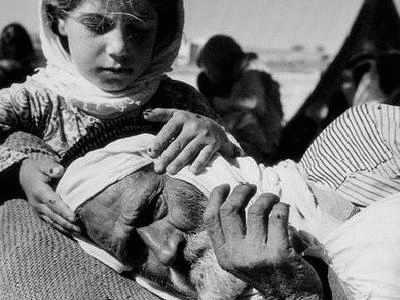Reprinted from Ramzy Baroud Website
On May 15th of every year, over the past 68 years, Palestinians have commemorated their collective exile from Palestine. The ethnic cleansing of Palestine to make room for a "Jewish homeland" came at a price of unrelenting violence and perpetual suffering. Palestinians refer to that enduring experience as "Nakba," or "Catastrophe."
However, the "Nakba" is not merely a Palestinian experience; it is also an Arab wound that never ceases from bleeding.
The Arab "Nakba" was namely the Sykes-Picot Agreement, which divided much of the Arab world between competing Western powers. A year later, Palestine was removed from the Arab equation altogether and "promised" to the Zionist movement in Europe, creating one of the most protracted conflicts in modern human history.
Despite all attempts at separating the current conflict in Palestine from its larger Arab environs, the two realities can never be delinked since they both go back to the same historical roots.
How Did This Come about?
When British diplomat, Mark Sykes, succumbed to the Spanish flu pandemic at the age of 39, in 1919, another diplomat, Harold Nicolson, described his influence on the Middle East region as follows:
"It was due to his endless push and perseverance, to his enthusiasm and faith, that Arab nationalism and Zionism became two of the most successful of our war causes."
Retrospectively, we know that Nicolson spoke too soon. The breed of "Arab nationalism" he was referencing in 1919 was fundamentally different from the nationalist movements that gripped several Arab countries in the 1950s and 60s. The rallying cry for Arab nationalism in those later years was liberation and sovereignty from Western colonialism and their local allies.
Sykes' contribution to the rise of Zionism did not promote much stability, either. The Zionist project transformed into the State of Israel, itself established on the ruins of Palestine in 1948. Since then, Zionism and Arab nationalism have been in constant conflict, resulting in deplorable wars and seemingly perpetual blood-letting.
However, Sykes' lasting contribution to the Arab region was his major role in the signing of the Sykes-Picot Agreement, also known as the Asia Minor Agreement, 100 years ago. That infamous treaty between Britain and France, which was negotiated with the consent of Russia, has shaped the Middle East's geopolitics for an entire century.
Throughout the years, challenges to the status quo imposed by Sykes-Picot failed to fundamentally alter its arbitrarily-sketched borders, which divided the Arabs into "spheres of influence" to be administered and controlled by Western powers.
Yet, with the recent rise of "Daesh" and the establishment of its own version of equally arbitrary borders encompassing large swathes of Syria and Iraq as of 2014, combined with the current discussion of dividing Syria into a federation, Sykes-Picot's persisting legacy could possibly be dithering under the pressures of new, violent circumstances.
Why Sykes-Picot?
Sykes-Picot was signed as a result of violent circumstances that gripped much of Europe, Asia, Africa and the Middle East at the time.
It all started when World War I broke out in July 1914. At the time, major European powers fell into two camps: the Allies -- consisting mainly of Britain, France and Russia -- vs. the Central Powers -- Germany and Austria-Hungary.
(Note: You can view every article as one long page if you sign up as an Advocate Member, or higher).





